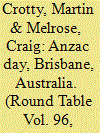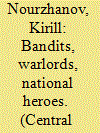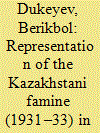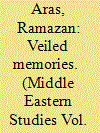|
|
|
Sort Order |
|
|
|
Items / Page
|
|
|
|
|
|
|
| Srl | Item |
| 1 |
ID:
080575


|
|
|
|
|
| Publication |
2007.
|
| Summary/Abstract |
This article proceeds through a case study of commemorative rhetoric in a British settler state, Australia, and in a provincial capital, Brisbane, whose dominant commemorative group, the Anzac Day Commemoration Committee (ADCC), had claims to have invented the national memorial rituals for the principal day of remembrance. It briefly surveys the broader Australian commemorative background, then explores the control of Anzac Day in Brisbane, focusing on accommodations and alliances between political, civil and religious leaders and the principal returned soldiers' organization, the Returned Sailors' and Soldiers' Imperial League of Australia (RSSILA) on the ADCC, in Anzac Day activities, and in Anzac Day rhetoric. The article suggests that the theme of 'triumphalism' has been underplayed in analysis of interwar commemorative rhetoric in Australia, and that cooperation, accommodation and alliance were more typical of interwar commemoration than contest
|
|
|
|
|
|
|
|
|
|
|
|
|
|
|
|
| 2 |
ID:
138248


|
|
|
|
|
| Summary/Abstract |
The history of the Basmachi movement has occupied a prominent place in the construction of a collective past in Soviet and post-Soviet Tajikistan. This article traces the evolution of its representations in the dominant narrative from the 1950s to the present day. It argues that official discourse in contemporary Tajikistan situates the Basmachis in the mould of a national struggle against Turkic oppression, rather than portraying them, in the manner of earlier prevalent models, as part of a class-based or anti-colonialist resistance. Among many public counter-narratives, the one focusing on the local appeal of the Basmachi leaders has the greatest potential to challenge the government-sponsored reading of Tajikistan’s past and thus the image of a unified nation it seeks to support.
|
|
|
|
|
|
|
|
|
|
|
|
|
|
|
|
| 3 |
ID:
190828


|
|
|
|
|
| Summary/Abstract |
This paper studies the role of textbook authors when portraying the Kazakhstani famine of 1931–33 in textbooks printed between 1992 and 2021 for the secondary school subject ‘The History of Kazakhstan’. Drawing on a multilayered and inter-discursive analysis of seven of these textbooks, and after 10 interviews with curriculum developers and textbook authors, this paper argues that authorship agencies have reflected a level of ambivalence: on the cause(s) of the famine; on their evaluation of it as a tragedy or as a genocide; on the identification of the perpetrators and victims; and the people’s revolt against the collectivization. The textbook authors have echoed the narratives from the cautious approach to the famine’s commemoration portrayed in state-led nation-building, to those in Kazakh nationalist narratives and the academic history. The results of this paper oppose the general assumption that textbook narratives are merely constructed from ‘above’ in a non-democratic state such as Kazakhstan.
|
|
|
|
|
|
|
|
|
|
|
|
|
|
|
|
| 4 |
ID:
174151


|
|
|
|
|
| Summary/Abstract |
Under the omnipresence of surveillance, control and fear of the state as ontological signifiers, not only agency but also subjective and collective memories of people become unspeakable, hidden and veiled. This paper aims to underline the difficulties of doing ethnographic research on the secular Turkish state formation and its diverse apparatuses with a particular focus on the single-party regime that started in 1923 and ended in 1950. This work claims that fear of the state, inaccessibility of the state archives, the inscription of protective laws such as lèse-majesté for founding figures of the state, and the senility of survivors result in muteness, the emergence of politics of forgetting and remembering that diminish the possibility of studying relations between the authoritarian secular state and its Muslim subjects. It is argued that the hegemony of emotions of fear of the state and insecurity have turned historical and ethnographic research on the subject matter into a difficult one. Based on a recently conducted large-scale oral history study in different parts of Turkey, this paper also analyzes the resistance, resilience, and silence of mass Muslim population towards diverse forms of state-sponsored authoritarian secular politics along with western and Turkish nationalist top-down regulations of the new regime.
|
|
|
|
|
|
|
|
|
|
|
|
|
|
|
|
|
|
|
|
|